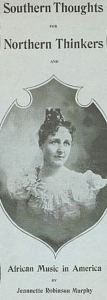
In 1904, a musician and lecturer by the name of Jeannette Robinson Murphy published an unusual volume entitled “Southern Thoughts for Northern Thinkers,” in which she voices several complex and controversial opinions about black music in the American South. Murphy, who grew up in the South, was intimately familiar with black spirituals and became well-known for giving lectures and demonstrations of spirituals to Northern audiences.
Although her academic approach to teaching and preserving spirituals certainly demonstrates her respect for the spiritual-singing tradition, she also exoticizes black music in a way that is deeply problematic, especially when viewed through a modern lens.
The opening paragraph of Murphy’s text reveals the deep respect she has for black spirituals. She writes:
“Fifty years from now, when every vestige of
slavery has disappeared, and even its existence has become a fading memory, America, and probably Europe, will suddenly awake to the sad fact that we have
irrevocably lost a veritable mine of wealth, through our failure to appreciate and study from a musician’s standpoint the beautiful African music, whose rich stores will then have gone forever from our grasp”
Modern-day readers may scoff at Murphy’s naivete in believing that slavery will be quickly forgotten, but it seems to me that her basic impulse is praiseworthy: she is arguing that African-American music is rich and beautiful, and that it is worthy of musicological study and preservation. Later on in the same chapter, she goes on to condemn blackface minstrelsy. Calling minstrel songs “base imitations” of African music, she insists that “the white man does not live who can write a genuine negro song.”
Despite her making several laudable arguments, Murphy still ends up voicing some seriously racist opinions about black music, at one point describing its melodies as “strange, weird, untamable [and] barbaric” but with a “rude beauty and a charm.” These exoticist statements make it difficult to endorse Murphy as any sort of progressive figure. In her writing, she simultaneously endorses black music and demonstrates a perverse fetishization of black culture. Although it may be tempting to try to read her work as simply an anti-racist text that champions black spirituals as important musics that are worthy of study, the truth seems to be far more complicated than that.
Sources
Murphy, Jeanette Robinson. “Southern thoughts for Northern thinkers.” New York: Bandanna Publishing, 1904. America’s Historical Imprints, accessed Nov. 15 2017.
